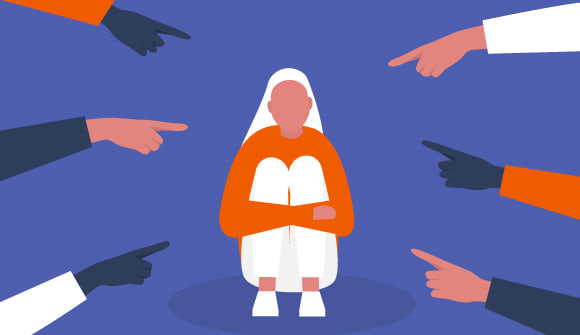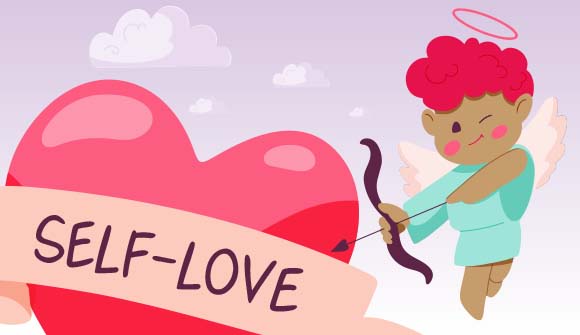5 common ways people stigmatize mental illness
Many people unintentionally contribute to mental health stigmas. Here's how we can change that.
Article Date:

One in five adults in the U.S. experiences mental health issues each year, so it's likely you or someone you know will be affected in your lifetime. Unfortunately, the stigma of mental illness can keep many people from speaking up or seeking help, and make those who are diagnosed feel judged, weak or flawed.
"When we talk about stigma, we talk about attitudes, prejudice, ignorance and discrimination around mental illness, which can occur at various levels. The American Psychiatric Association categorizes stigma into three broad groups: public stigma, self-stigma and institutional stigma," said Savitha Puttaiah, MD, a psychiatrist and medical director of Baptist Behavioral Health. "Each of these acts as a barrier in seeking help and staying in contact with mental health services."
Here are five common ways people stigmatize mental illness:
1. Labeling someone based on their condition
When a person is diagnosed with a physical condition like arthritis or diabetes, it would be considered insensitive to call them an "arthritic" or a "diabetic." People aren't defined by their diseases. However, you've probably heard people calling others "bipolar" or "depressed."
"We should always strive to use a person-centered approach. For example, someone should be described as 'a person with schizophrenia' rather than being described as 'schizophrenic,'" said Dr. Puttaiah. "Using appropriate terminology encourages others to use a person-centered approach and reinforces that affected individuals deserve compassion and care."
2. Blaming tragedies on mental illness
After a mass shooting, authorities and media outlets seem to frequently focus on the mental health of the perpetrator. More often than not, such conclusions are drawn without any prior knowledge of the perhistory of mental illness. Drawing these connections between mental health and major tragedies feeds into the myth that patients with mental illness are violent, dangerous and more likely to commit crimes.
"These types of messages can directly contribute to public stigma, encouraging a negative belief about those with mental illness," said Dr. Puttaiah. "This also leads people to have unwarranted negative emotional reactions such as anger or fear towards a subset of the population already struggling with mental illness and complex emotions."
3. Describing typical emotions as mental health conditions
We all have tough days, but using clinical diagnoses to describe our feelings demonstrates a lack of understanding. It also can minimize how difficult those conditions are for people living with them.
"When someone uses terms like 'OCD' or 'depressed' to describe everyday experiences, the original technical meaning of the term is weakened. It normalizes the illness," Dr. Puttaiah explained. "When someone who likes things neat and tidy says 'I'm so OCD,' it can make those with actual obsessive-compulsive disorder doubt their own diagnosis and stop them from engaging in treatment."
4. Judging or teasing someone for abnormal behavior
According to Dr. Puttaiah, it's unfortunately not uncommon for people with mental illness to be mocked for their abnormal behaviors.
"It's not likely for someone to joke about another person's physical illness. The same should apply to mental illness," Dr. Puttaiah said. "It's important that we encourage equality between the two. If you witness someone mocking a person with mental illness, encourage them to draw comparisons to how they would treat someone with cancer or diabetes."
5. Using harmful words to describe someone with mental illness
It's important to be mindful of how we talk about mental illness to avoid reinforcing negative stereotypes.
"Referring to someone with mental illness as 'crazy' or 'insane' can contribute to self-stigma, an internalized shame that people with mental illness have about their own condition," said Dr. Puttaiah. "Self-stigma significantly decreases interest in seeking help. Research shows that self-stigma negatively impacts the recovery of people with severe mental illnesses by decreasing their self-esteem and self-worth, reducing their hope for recovery, affecting their social relationships, and worsening their psychiatric symptoms."
How do we reduce mental health stigmas?
If you've done any of these things, you're not alone – we've all made these mistakes. Dr. Puttaiah said one of the best ways to change these behaviors is to be conscious of the language we use and treat others as we would want to be treated.
Dr. Puttaiah suggested the following simple tips:
What to say to someone with mental illness:
- "Thanks for opening up to me."
- "Is there anything I can do to help?"
- "I'm sorry to hear that. It must be tough."
- "I'm here for you when you need me."
- "I can't imagine what you're going through."
- "How are you feeling today?"
- "I love you."
What not to say to someone with mental illness:
- "It could be worse."
- "Just deal with it."
- "Snap out of it."
- "Everyone feels that way sometimes."
- "You may have brought this on yourself."
- "We've all been there."
- "You've got to pull yourself together."
- "Maybe try thinking happier thoughts."
Dr. Puttaiah added, "Some of the best ways we as individuals can help reduce the stigma around mental illness is by educating ourselves, being conscious of language, talking openly about mental health, choosing empowerment over shame, and showing compassion to those with mental illness."
Don't let stigmas stop you from getting mental health treatment
Take a step toward prioritizing mental well-being today. If you or a loved one needs a consult about mental health concerns, Baptist Behavioral Health can provide you with the support and mental health services you need. Call 904.376.3800 to schedule an appointment.



